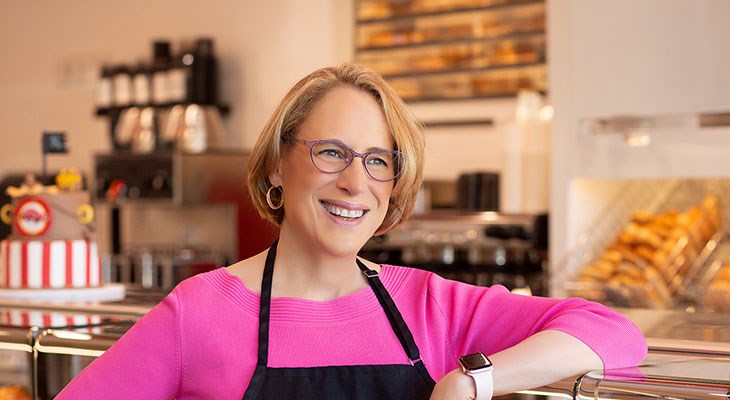After selling multi-million-dollar communications systems for Lucent Technologies and Avaya, Janice Jucker joined her husband, a fifth-generation baker, at Three Brothers Bakery. While he was behind the mixing bench, she ran the counter. Tied to the business as president and co-owner, she said at the Houston Smart Business Dealmakers Conference that they couldn't see a way out of their situation.
Then by chance they met someone who offered to talk to them about their business — a business coach. Through him, they learned to work on rather than in their business, and that they might not be the best managers, so they hired someone to run it. Because of that, they now have four stores and are looking for a fifth. Eventually, however, she says they have to sell the business because there is no sixth generation — the kids are not coming into the bakery.
She says they have slowly bought-out everybody in the family — multiple people, some relatives and other married into the family and then divorced — who owned a stake in the business.
“We've slowly acquired from everyone, and I could write a book on how to do it right and how to do it wrong,” Jucker says.
Through all the challenges, she says there was one thing some of the former owners did right: they put in a buy-sell agreement, which helped her with all the buyouts. But with one member of the family who was a great negotiator created a wrinkle in their progress.
“At one point, we thought we had a deal,” she says. “And our lawyer had some illness, so I just waited for him to get better and then we'll just do all the paperwork. Someone up here said, ‘Once you get a deal, you got to keep moving.’ And so, I learned that lesson the hard way. She backed out.”
That created tension within the family. But the holdout finally agreed.
“Maybe we paid a little more than we should have, but it was worth it to keep that relationship,” she says.
Something that helped her finalize part of the deal was advice she heard from a speaker who said, ‘In every negotiation, there's something that you have to find that has nothing to do with money. And you have to figure out what it is.’ She says she thought hard about what that could it be and figured out that it was baked goods — the person wanted to make sure baked goods from the bakery would be available for kids, grandkids and for weddings.
“So, we put a line in the agreement about baked goods,” Jucker says. “That wasn't good enough. Two lines. Not good enough. Three lines. Not good enough. We have a whole addendum on baked goods, and that was what sealed the deal.”
Even though the idea is to eventually sell, she says at the moment she thinks they're too small to be acquired. To address that, she says they need to add stores and vacillated at one point about doing bakery cafes and other different models. Now, they've got the model figured out — little 1,500-square-foot stores — and they've worked to try to make them more independent from the main location. They have a production facility and main store together, along with the remote stores. So, they want them to bake off as much as they can so they're not out there doing deliveries. They also want to move away from their custom cakes as they expand the business, and instead push their seasonal products.
“The goal has been to make it where you can replicate it, and it's easy to run,” she says. “And so, each store we get better and better. Personally, I think it'll probably be eight to 10 years before we can actually sell, be in a space where it's worth it for someone to buy us and it's enough for us to live out our old age. That's what we're hoping for.”
As part of improving the business, she says she worked on the culture. But it wasn’t until she had gone through the Goldman Sachs 10,000 Small Businesses program’s module on people that her eyes were opened to the idea that even her small bakery had one.
“I didn't think we had one because we weren't a corporation,” she says. “But then I realized we did and that culture was toxic. And so, I really wanted to work to change that. And I felt that was really, really important.”
During the pandemic, she says she felt as if they had made progress on that goal because not one person at the bakery asked to be laid off.
“So, I felt like we had finally achieved — it took about eight years — to make that transition into what I think is a great place to work,” Jucker says.
Because they’re selling cakes, pies, breads and cupcakes, to significantly grow the business with what they’ve got is a challenge. It means opening more locations. They’re also not selling a necessity, so when the economy goes down, people are not necessarily going to buy holiday gifts, which had her worried. But to get 20-30 percent growth, the only way to do that is to open more stores.
“I've looked into franchising,” she says. “People ask us to franchise all the time. And that's not something I really want to be doing. If somebody would like to buy us and do that, I think it'd be a great thing. But I just don't think I have it in me to do that by myself.”




